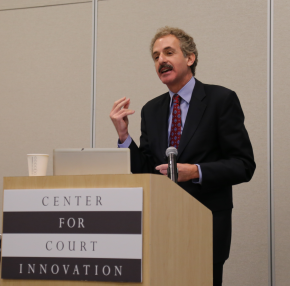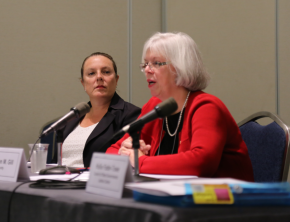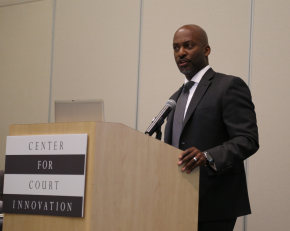ANAHEIM – More than 100 judges, prosecutors, defense attorneys, community organizers, faith leaders, and researchers gathered at a regional symposium here to discuss the challenges and opportunities facing justice reformers in California. Organized by the Center for Court Innovation in partnership with the U.S. Department of Justice's Bureau of Justice Assistance and the Judicial Council of California, "Courts, Community Engagement, and Innovative Practices in a Changing Landscape” focused on strategies for building a more effective and humane justice system and the significance of recent justice reforms in California.

Los Angeles City Attorney Mike Feuer and Alameda County Chief Public Defender Brendon Woods delivered keynote addresses, offering their visions for reform and their perspectives on the impact of Public Safety Realignment and Proposition 47.
Public Safety Realignment, commonly known as realignment, refers to changes brought about by 2011 legislation that shifted responsibility for certain populations of offenders from the state to the county level. These changes included shifting many inmates to county jails, increasing the use of community supervision, and reducing sentences for certain offenses. Proposition 47, a ballot initiative passed by referendum in 2014, reclassified certain low-level felonies as misdemeanors.
City Attorney Feuer, whose office is responsible for prosecuting misdemeanors in Los Angeles and has taken on an expanded caseload due to Proposition 47, said that prosecutors should be judged by looking at public safety and community well-being, not just cases cleared. “The lazy metric of conviction rate does not work,” Feuer said. “If you do neighborhood prosecution with low-level offenders, you can keep people out of the justice system entirely. That’s a better measure.”

The symposium at the Anaheim Marriot Hotel drew faculty from governments and organizations across California and the United States, including the Center for Court Innovation, the Judicial Council of California, the Council of State Governments, the Los Angeles County Sheriff’s Department, the Oakland Mayor’s Office, the Public Policy Institute of California, the San Diego Department of Probation, the Santa Clara County Office of Pretrial Services, and the Yolo County District Attorney’s Office.
Sessions covered a broad range of topics, including race and justice system legitimacy, jail reduction, risk assessment, and justice and mental health.
During a morning panel, “Taking Stock of Justice Reform,” the conversation highlighted the importance of considering reform on both macro and micro levels. Magnus Lofstrom, a senior research fellow at the Public Policy Institute of California, emphasized the value of a data-driven approach to reform.
He noted that policy debates can be influenced by rhetoric not supported by fact and cited as an example claims that realignment has contributed to a spike in crime. “We should let data and research guide the challenges we face,” he said. Speaking after Lofstrom, Superior Court Judge Stephen Manley, who helped found mental health and drug treatment courts in Santa Clara County, called for wider use of evidence-based practices by courts. He also spoke about what reform means on a human scale. “We never used to look at defendants as individuals,” Manley said. “What did we do in drug courts that was different? We looked at individuals."

Stockton Police Chief Eric Jones, a panelist for a conversation on “Legitimacy, Race, and Procedural Justice,” spoke to an issue that has been at the forefront of the national conversation about the justice system in 2015: the relationship between the police and communities of color. Jones said that police departments serve these communities better and more effectively if they have an understanding of the freighted history of this relationship. “We need to acknowledge that we carry that racial history with us," he said.
His department now offers officers implicit bias training, which seeks to make officers more aware of how unconscious biases may affect how they approach their work. “The officers actually crave this training,” Jones said.

The daylong symposium was powerfully kicked off by Chief Public Defender Woods, who delivered the morning’s first keynote speech. Woods said the changes he has seen in California over the past five years have been encouraging, but that the need for reform is more urgent than ever.
“We have the power to make a difference. Law enforcement must make the system better by treating people differently, like they are our brothers, our sisters, our cousins,” he said. “If we don’t do it, if we don’t do it, then who?”
- Click here for the summit agenda.
- To see supplemental materials, click here.
- Twitter coverage of the summit used the hashtag: #CCICL15.
Related Podcasts
A New Measure of Success for Prosecutors: Los Angeles City Attorney Mike Feuer
'Evidence-based Practices for Community Corrections': San Diego County Chief Probation Officer Mack Jenkins
Race and the Path to Better Policing: Stockton Police Chief Eric Jones
Letting Data Do The Talking: Magnus Lofstrom of the Public Policy Institute of California
'A Social Worker With a Robe': Judge Joe Perez of the Orange County Community Court
The Strengths and Limitations of Risk Assessment: Professor Susan Turner of the University of California-Irvine
'Hammers Don't Work': Alameda County Chief Public Defender Brendon Woods

